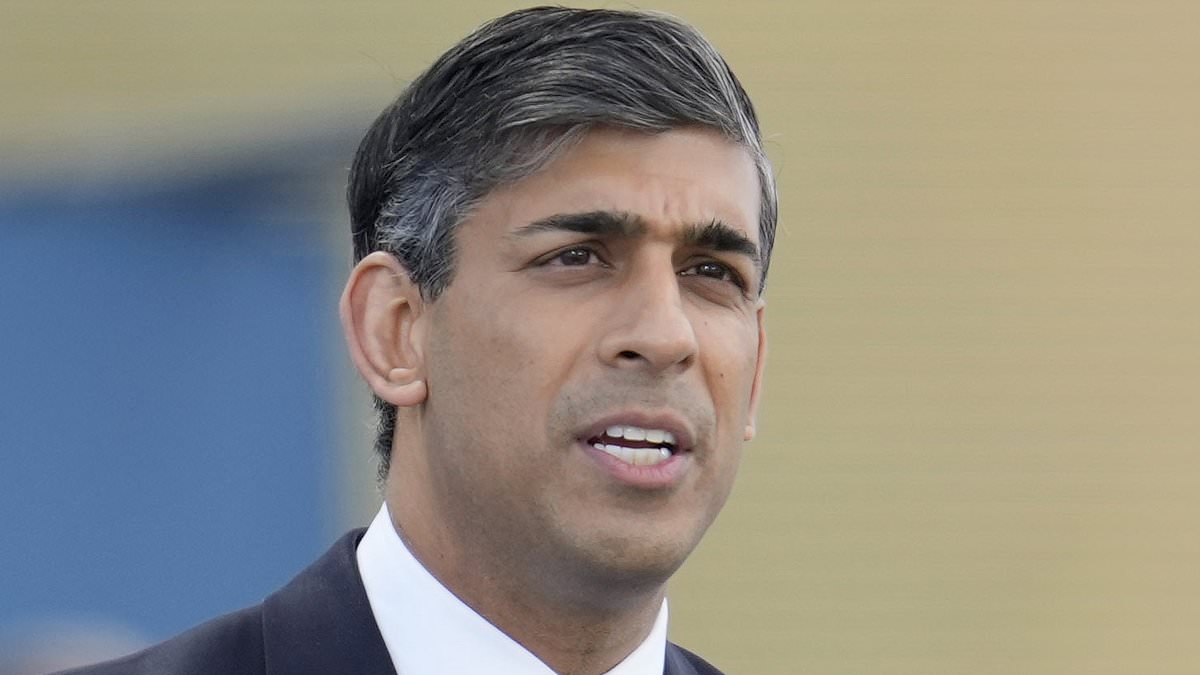Political polling is as much an art as a science. In the past few days, we have seen Labour leads as high as 27 percentage points and as low as 12. What is going on?
My surveys differ from those of most pollsters in that I ask people how likely they think they are to vote for each party on a 100-point scale.
Of those saying they are more likely than not to vote for a particular party, 47 per cent are currently leaning towards Labour and 23 per cent towards the Conservatives.
But in this snapshot, we also find large numbers – including a massive 31 per cent of those who voted Tory in 2019 – who say they don’t know what to do or will not vote at all.
And in this group, seven out of ten say that, although they’re dissatisfied, they would rather have a Conservative government than a Labour one.
If, on the day, these voters back Rishi Sunak in the polling booth, the Labour lead narrows from 24 points to 15.
Some of those 2019 Conservatives prefer the Tories to Labour but are minded to switch, instead, to Reform UK. If they, too, vote for Mr Sunak, the Labour lead narrows further – although this is a less likely prospect, especially with the leader of Reform, Nigel Farage, back in the game.
We don’t know how many of these disgruntled former Tories will actually return to the fold on July 4 – and at this stage, it’s unlikely they do either.
For Labour, the distance between the floor and the ceiling of its potential support looks quite narrow.
For the Conservatives, the potential range is bigger, though their floor is very low indeed unless something dramatic happens. At this stage, even on their best day, the Tory ceiling is well below the Labour floor.
All of this helps explain the dynamics of the campaign so far. The Tories are desperate to get the Boris band back together (despite having fired the lead singer) by playing a few of the old hits, the new ‘quadruple lock’ on pensions being the quintessential example.
This particular idea polls best among former Conservatives. It is perhaps no surprise that those aged 65 or over are eight times more likely to say they strongly approve of the ‘quadruple lock’ than 18 to 24-year-olds. The Conservatives have also tried to highlight the significance of national security, promising to raise the proportion of national income spent on defence.
While this has been a strong area for Tories in the past, however, this week I’ve found voters more likely to say they trusted Sir Keir Starmer and Labour on the issue than Mr Sunak and the Conservatives.
Sir Keir’s speech this week pledging to secure Britain’s nuclear deterrent – something unimaginable under his predecessor Jeremy Corbyn – shows his determination not to concede any ground to the Tories.
At this stage, indeed, any Conservative campaign pledge will be met with huge scepticism, even among those who voted for the party last time round.
In my focus groups conducted around the country, the 2019 Tories have been scathing about the Government’s record, pointing out that, after 14 years, it has no one to blame for the state of the country but itself. People will be especially wary of promised tax cuts.
As I found, plenty of voters would like to see taxes reduced from their historically high level – council tax, fuel duty, income tax and inheritance tax being the most popular candidates for the chop.
But asked which party would be most likely to bring such relief, ‘none of them’ is by far the most popular answer.
Labour, meanwhile, is trying to hold on to its commanding lead.
For some voters, the Diane Abbott saga has confirmed their view of Sir Keir as a ditherer and I found many still have their doubts about his party. His plan to tax private school fees is often raised as an example of continued hostility to aspirational middle England.
But in my poll, looking at different aspects of being Prime Minister, we find Sir Keir ahead on everything from representing the UK abroad (by eight points) to ‘making things happen and getting things done’ (by 14 points) to ‘understanding people like me’ (by 27 points).
His promise to bring down immigration – another bold pledge that Mr Corbyn would never have considered, even if voters treat it with suspicion – also shows his determination to stand his ground, newly staked or not.
If anything, Labour has consolidated its position since Mr Sunak unexpectedly fired the starting gun.
Even if the Conservative leader was the more polished performer in last night’s televised debate, there is no sign yet of the game-changer his party needs.
